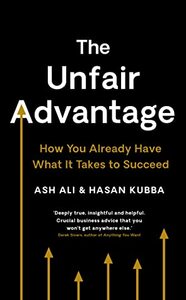You need to sign in or sign up before continuing.
Take a photo of a barcode or cover
49 reviews for:
The Unfair Advantage: How You Already Have What It Takes to Succeed
Ash Ali, Hasan Kubba
49 reviews for:
The Unfair Advantage: How You Already Have What It Takes to Succeed
Ash Ali, Hasan Kubba
informative
slow-paced
hopeful
informative
inspiring
reflective
slow-paced
hopeful
informative
inspiring
medium-paced
informative
inspiring
medium-paced
adventurous
hopeful
informative
inspiring
reflective
slow-paced
hopeful
informative
inspiring
lighthearted
reflective
fast-paced
Good concept bad execution
Honestly all that this book had to say could've been summarized in a blog post.
Honestly all that this book had to say could've been summarized in a blog post.
challenging
informative
reflective
fast-paced
informative
inspiring
reflective
medium-paced
4 Stars // We all have it, but only a few of us are really making full use of it - I’m speaking of the Unfair Advantage. This one special talent or gift that sets us apart from others, that gives us a competitive upper hand. Ash Ali & Hasan Kubba are two young British entrepreneurs, who framed this concept and tailored this whole book around it. Both immigrated to England when they were younger and, coming from a working class background, had to work their way up the career ladder. In the end, both become successful business men in their own rights - Ash Ali was the first marketing director at Just East, having stakes in the company from very early on. Hasan Kubba became a self-taught digital entrepreneur and marketing expert, helping businesses to grow and find their competitive upper hands.
According to the authors, an Unfair Advantage is a condition, asset or circumstance that puts you in a favourable business position. It can’t easily be copied or bought. Your set of Unfair Advantages is unique to you, which makes them… well, unfair. The two authors simplified this concept by creating the so-called MILES framework, standing for Money, Intelligence & Insight, Location & Luck, Education & Expertise, as well Status.
Each and everyone of us has at least one of these advantages - often unknowingly so. The book goes on about how to find your advantages and shines light on potential advantages you most likely have not thought about. It gives good examples of what counts as an advantage and how to make use of them. The last third then is somewhat of a handbook for young entrepreneurs on how find a business idea, find the right people to collaborate with and how to raise money to let your idea come to fruition.
Overall, this is a neat little business book worth 4 stars. It falls a bit into the trap that many business books fall into - it could have easily been an elaborated blog post, as there is some repetition in here, a bit of fluff to make chapters seem longer and of more substance than they really are. The last third is a nice extra, but sort of feels like a different book. Where as the concept of the Unfair Advantage applies to almost everyone, the last third feels especially tailored to start-up founders, which probably not every reader of the book can relate to. I am happy though to have read it fully, as identifying your own Unfair Advantages is part of a really important process in business and life: To get to know yourself. And that applies to everyone.
According to the authors, an Unfair Advantage is a condition, asset or circumstance that puts you in a favourable business position. It can’t easily be copied or bought. Your set of Unfair Advantages is unique to you, which makes them… well, unfair. The two authors simplified this concept by creating the so-called MILES framework, standing for Money, Intelligence & Insight, Location & Luck, Education & Expertise, as well Status.
Each and everyone of us has at least one of these advantages - often unknowingly so. The book goes on about how to find your advantages and shines light on potential advantages you most likely have not thought about. It gives good examples of what counts as an advantage and how to make use of them. The last third then is somewhat of a handbook for young entrepreneurs on how find a business idea, find the right people to collaborate with and how to raise money to let your idea come to fruition.
Overall, this is a neat little business book worth 4 stars. It falls a bit into the trap that many business books fall into - it could have easily been an elaborated blog post, as there is some repetition in here, a bit of fluff to make chapters seem longer and of more substance than they really are. The last third is a nice extra, but sort of feels like a different book. Where as the concept of the Unfair Advantage applies to almost everyone, the last third feels especially tailored to start-up founders, which probably not every reader of the book can relate to. I am happy though to have read it fully, as identifying your own Unfair Advantages is part of a really important process in business and life: To get to know yourself. And that applies to everyone.



